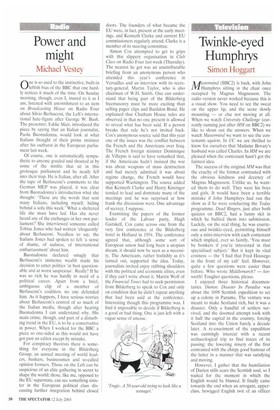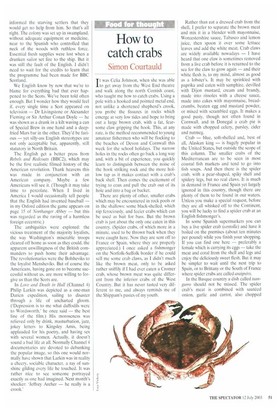Twinkle-eyed Humphrys
Simon Hoggart
Mastermind (BBC2) is back, with John Humphrys sitting in the chair once occupied by Magnus Magnusson. The radio version never worked because this is a visual show. You need to see the sweat on the upper lip, and the score slowly mounting — or else not moving at all. When we watch University Challenge (currently running just after MM on BBC2) we like to shout out the answers. When we watch Mastermind we want to see the contestants squirm. In UC we are thrilled to know for ourselves that Madame Bovary's husband was called Charles. In MM we are pleased when the contestant hasn't got the faintest idea.
The success of the original MM was that the cruelty of the format contrasted with the obvious kindness and decency of Magnus Magnusson. Unlike us, he wanted them to do well. They were his boys and girls. It would have been a terrible mistake if John Humphrys had run the show as if he were conducting the Today programme. Dead Ringers, just after both quizzes on BBC2, had a funny skit in which he bullied them into submission. Luckily, on the real thing, he was courteous and twinkle-eyed, permitting himself only a mini-interview with each contestant which implied, ever so faintly, 'You must be honkers if you're interested in that specialised subject.' But it kept its vital cosiness — the 'I had that Fred Housego in the front of my cab' feel. However, quite a few questions were easier than before. Who wrote Middlemarch? — forsooth! Tougher questions, please.
I enjoyed three historical documentaries. Darien: Disaster In Paradise was about the 1698 Scottish expedition to set up a colony in Panama. The venture was meant to make Scotland rich, but it was a disaster. Only a handful of settlers survived, and the doomed attempt took with it half the capital in the country, forcing Scotland into the Union barely a decade later. A re-enactment of the expedition was cunningly intercut with a recent archaeological trip to find traces of its passing: the lowering misery of the first contrasted with the chirpy good humour of the latter in a manner that was satisfying and moving.
However, I gather that the humiliation of Darien stills scars the Scottish soul, so I waited for the moment in which the English would be blamed. It finally came towards the end when an arrogant, upperclass, bewigged English twit of an officer informed the starving settlers that they would get no help from him. So that's all right. The colony was set up in swampland, without adequate equipment or medicine, near to the Spanish who controlled that neck of the woods with ruthless force.
Essential fresh supplies were lost when a drunken sailor set fire to the ship. But it was still the fault of the English. I didn't need to wait for the credits to learn that the programme had been made for BBC Scotland.
We English know by now that we're to blame for everything had that ever hap pened to the Scots. We've been told often enough. But I wonder how they would feel if, every single time a Scot appeared on television — Dr Livingstone or Alexander Fleming or Sir Arthur Conan Doyle — he was shown as a drunk in a kilt waving a can of Special Brew in one hand and a deepfried Mars bar in the other. They'd be furious — yet silly-ass English stereotypes are not only acceptable but, apparently, still statutory in North Britain.
The English get a better press from Rebels and Redcoats (BBC2), which may be the first realistic filmed history of the American revolution. Thank heavens this was made in conjunction with an American company. Maybe a few Americans will see it. (Though it may take time to percolate. When I lived in America I would occasionally tell people that the English had invented baseball — in my Oxford edition the game appears on page 15 of Northanger Abbey — but this was regarded as the raving of a harmless foreign eccentric.) The ambiguities were explored: the vicious treatment of the majority loyalists, the way Washington's miserable troops cleared off home as soon as they could, the apparent unwillingness of the British com manders to push home their advantage.
The revolutionaries were the Bolsheviks to the loyalist Mensheviks. But of course the Americans, having gone on to become successful without us, are more willing to forgive us than the Scots are.
In Love and Death in Hull (Channel 4) Philip Larkin was depicted as a one-man Darien expedition, sailing to disaster through a life of uncharted gloom. (Depression is to me what daffodils were to Wordsworth,' he once said — the best line of the film.) His moroseness was relieved only by drink, masturbation, jazz, jokey letters to Kingsley Amis, being
applauded for his poetry, and having sex with several women. Actually, it doesn't sound a bad life at all. Normally Channel 4
documentaries are devoted to debunking the popular image, so this one would normally have shown that Larkin was in reality a cheery, sociable character, a ray of sun shine gilding every life he touched. It was rather nice to see someone portrayed exactly as one had imagined. Next month's shocker: 'Jeffrey Archer — he really is a crook.'



































































 Previous page
Previous page